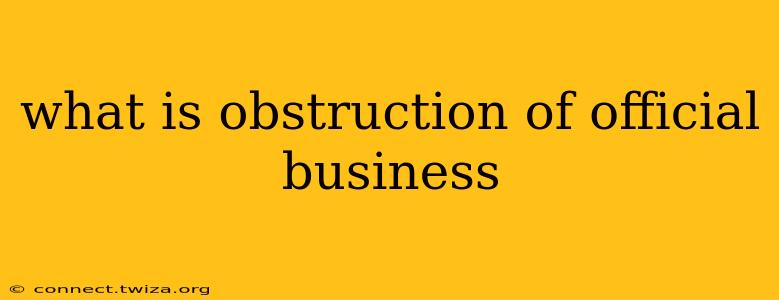Obstruction of official business, often referred to as interfering with a public official, is a crime that involves hindering or impeding a government employee's ability to perform their lawful duties. This isn't limited to physical interference; it encompasses a broad range of actions that disrupt official processes. The specifics of the crime vary by jurisdiction, but the core principle remains consistent: it's illegal to intentionally prevent a public servant from doing their job.
What Constitutes Obstruction of Official Business?
The definition of obstruction can be surprisingly broad. It's not just about physically assaulting or threatening an officer; it can include more subtle actions, such as:
-
Providing false information: Intentionally misleading a police officer, investigator, or other official during an inquiry is a common form of obstruction. This could involve lying about your whereabouts, involvement in an event, or providing false documents.
-
Resisting arrest: While this is often a separate charge, resisting arrest is a clear example of obstructing official business. Actively fighting against lawful apprehension directly impedes the officer's ability to perform their duty.
-
Interfering with evidence: Destroying, concealing, or tampering with evidence relevant to an investigation constitutes obstruction. This could include anything from shredding documents to hiding a weapon.
-
Failing to comply with a lawful order: Refusing to follow a lawful instruction from a police officer or other official, without valid legal justification, can be considered obstruction.
-
Harassing or intimidating officials: Continuously harassing or intimidating a public official to prevent them from performing their duties is another form of obstruction. This could involve threats, stalking, or persistent disruptive behavior.
-
Filing frivolous lawsuits: While access to the courts is vital, filing lawsuits intended solely to harass or delay official proceedings can be considered obstruction.
Important Note: The intent to obstruct is usually a key element of the crime. Accidental interference is generally not considered a criminal offense. The prosecution needs to prove that the accused acted deliberately to hinder the official's duties.
What are the Penalties for Obstruction of Official Business?
Penalties for obstruction of official business vary widely depending on the severity of the offense and the jurisdiction. They can range from:
-
Fines: Monetary penalties can be substantial, especially in cases involving significant interference.
-
Jail time: In more serious cases, particularly those involving violence or significant disruption, jail time is a common penalty.
-
Probation: This allows the offender to remain free in the community under court supervision, often with conditions like community service or drug testing.
-
Combination of penalties: Courts often impose a combination of fines, jail time, and probation, depending on the specifics of the case.
How is Obstruction of Official Business Different from Other Crimes?
Obstruction of official business differs from other crimes, like assault or resisting arrest, in that its focus is on the impediment of official duties. While assault or resisting arrest might be elements of obstruction, obstruction itself centers on the disruption of the government's ability to function. For example, someone could be charged with obstruction even without physical contact if their actions significantly hinder an investigation.
What are the Defenses Against Obstruction of Official Business?
Defenses against obstruction charges typically involve arguing that:
-
The official acted unlawfully: If the official's actions were illegal, the defendant's resistance might be justified.
-
There was no intent to obstruct: The defendant might argue that their actions were unintentional or that they had no knowledge of the official's duties.
-
The interference was minimal: The defense may argue that any interference was insignificant and didn't materially impede the official's work.
This information is for educational purposes only and not legal advice. If you are facing charges of obstruction of official business, you should seek the advice of a qualified legal professional.
